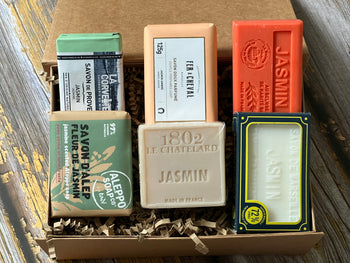
Gifting couldn't be easier
Add a gift message to be emailed to when their parcel arrives, or at a time of your choice.
Coconut oil has been treasured for centuries, not only as a food but as a powerful natural ingredient in body care, soap making, and healing rituals.
Derived from the kernel or meat of mature coconuts, this rich, multipurpose oil is now a cornerstone in both traditional remedies and modern skincare routines.
The use of coconut oil dates back over 4,000 years in tropical regions like Southeast Asia, India, the Philippines, Polynesia, and the Caribbean. In Ayurvedic medicine, it was used to treat skin ailments and cool inflammation. Islanders used coconut oil for hair protection from salt and sun, and early soap makers prized it for its lather and shelf stability.
By the 20th century, coconut oil became a key ingredient in commercial soap and shampoo due to its cleansing power and low cost. Though briefly vilified for its saturated fat content in the food industry, it has reemerged as a natural wellness hero in skincare and soap making.
Coconut oil is packed with medium-chain fatty acids, especially lauric acid, giving it strong antibacterial, antifungal, and moisturizing properties.
Cleansing Power: Creates a fluffy, rich lather in soap
Moisturising: Helps prevent dryness by forming a protective barrier
Antibacterial & Antifungal: Fights acne-causing bacteria and common skin irritations
Anti-inflammatory: Soothes eczema and dermatitis
Shelf Stability: Naturally resists oxidation, preserving product freshness
Haircare Hero: Conditions, detangles, and reduces protein loss in hair
Though generally considered gentle, coconut oil is not suitable for everyone.
Coconut allergy is rare but real; reactions may include itching, rash, or swelling
May clog pores in acne-prone skin when used in high concentrations
Overuse in hair can lead to buildup, especially in fine or low-porosity hair types
Look for cold-pressed, organic, unrefined coconut oil
Use sparingly on facial skin if you’re acne-prone
Perform a patch test before full application
Coconut oil production is largely sustainable compared to palm oil, but ethical concerns remain.
High-yield crop: Coconuts grow in abundance with relatively low input
Byproduct use: Husks, shells, and water are reused in food and manufacturing
Biodegradable: Coconut oil-based soaps are eco-friendly and safe for waterways
Labor exploitation in some regions (especially in Southeast Asia)
Animal cruelty concerns (monkeys trained for harvesting in unethical practices)
Shipping footprint from tropical countries
Fair Trade and organic certifications
Suppliers committed to ethical harvesting and local empowerment
While coconuts do not grow in Provence or Marseille, coconut oil has become an integral ingredient in modern interpretations of these regions’ traditional soaps.
Traditionally made with olive oil, Marseille soap (Savon de Marseille) has evolved to include coconut oil in modern variations. Coconut oil brings a rich, foaming lather that's normally absent in soap from Provence and improves the cleansing ability of the soap, particularly in liquid soap formulations. The ingredient “sodium cocoate” (saponified coconut oil) appears often in the ingredient list of both bar and liquid Marseille soaps.
Soap makers such as Fer à Cheval, Bleu Jaune and others have embraced coconut oil in blended formulas alongside olive and palm oil (to minimise the use of RSPO palm) and to maintain traditional craftsmanship while enhancing user experience. Le Chatelard 1802 use it as a base for their richer soap formulations. It is a key ingredient in our Liquid Marseille Soaps and laundry products.
Smaller soap ateliers across Provence have incorporated coconut oil to increase hardness and foam quality in bar soaps. It pairs beautifully with regional botanicals like lavender, verbena, and rose, providing a solid base for essential oils and natural colorants. In some Provence soaps, coconut oil makes up a significant part of the formulation—especially in products designed for dry skin or hair care.
Coconut oil also allows Provence brands to offer vegan, palm-free, and cruelty-free alternatives to classic recipes, helping them appeal to modern consumers looking for ethical and skin-friendly body care.
Coconut oil can benefit most skin types, but it's especially suited for:
Dry or irritated skin
Rough elbows, knees, or heels
Scalp treatment and dry, frizzy hair
Mature skin needing extra nourishment
Those with oily or acne-prone skin should patch test or opt for formulations where coconut oil is blended with other ingredients.
Coconut oil contributes hardness, creamy lather, and cleansing power
Often used in Castile-style and Marseille soaps in combination with olive oil
Provides foaming action and long-lasting suds
Common in natural shampoo, hand wash, and baby wash
Found in lotions, balms, hair masks, lip products, and body oils
Used as a carrier oil for essential oil blends
If you’re sensitive to coconut oil or want to explore options:
Shea Butter: Rich and anti-inflammatory
Olive Oil: Gentle, deeply moisturizing
Jojoba Oil: Lightweight, balances sebum
Avocado Oil: Nourishing and vitamin-rich
Coconut oil remains one of the most versatile, affordable, and effective natural ingredients in soap and skincare. In Marseille and Provence, its inclusion in traditional formulations reflects the region’s commitment to quality, innovation, and skin health. When sourced responsibly and used appropriately, coconut oil offers a wealth of benefits for skin and hair. It is a modern classic—grounded in global tradition and adapted by the time-honoured soapmakers of Southern France.
©️ French Soaps UK 2025
If you would like help shopping this article, or have further product or ingredient questions then please contact us and we will be happy to help. E. bonjour@frenchsoaps.co.uk T. 01423 803080
Telephone or Whats App: 01423 803080
Email: bonjour@frenchsoaps.co.uk
Social: @FrenchsoapsUK
Address: Unit 14 Ousegill Business Park, Carr Side Road, Great Ouseburn, North Yorkshire, YO26 9AE
Sign up for our newsletter and get all the latest news, offers and more delivered straight to your inbox. You can unsubscribe at any time. By 'submitting' you are agreeing to our T&C's and Privacy Policy.
Gifting couldn't be easier
Add a gift message to be emailed to when their parcel arrives, or at a time of your choice.



